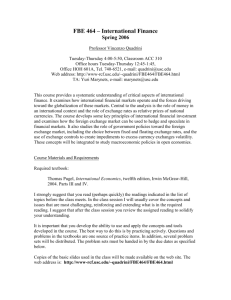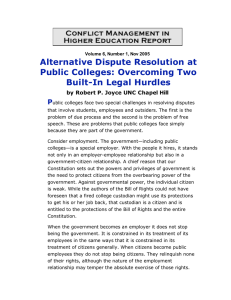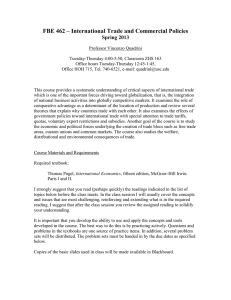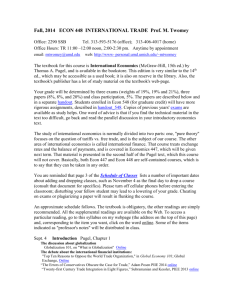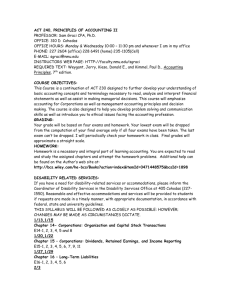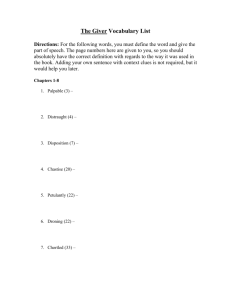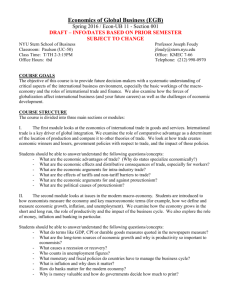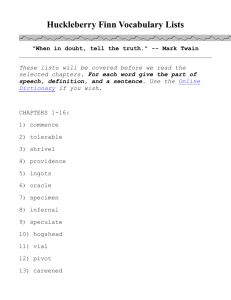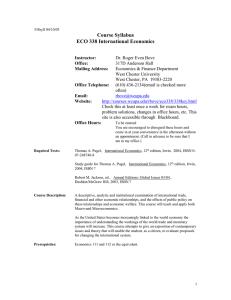(SIS-616) Syllabus
advertisement
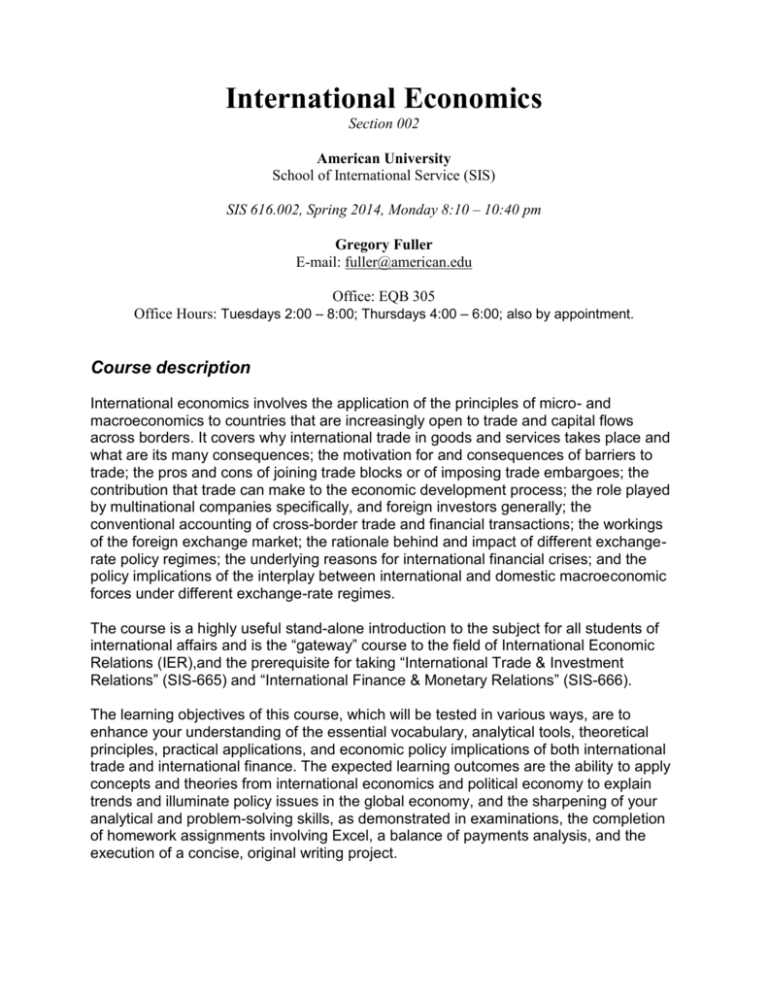
International Economics Section 002 American University School of International Service (SIS) SIS 616.002, Spring 2014, Monday 8:10 – 10:40 pm Gregory Fuller E-mail: fuller@american.edu Office: EQB 305 Office Hours: Tuesdays 2:00 – 8:00; Thursdays 4:00 – 6:00; also by appointment. Course description International economics involves the application of the principles of micro- and macroeconomics to countries that are increasingly open to trade and capital flows across borders. It covers why international trade in goods and services takes place and what are its many consequences; the motivation for and consequences of barriers to trade; the pros and cons of joining trade blocks or of imposing trade embargoes; the contribution that trade can make to the economic development process; the role played by multinational companies specifically, and foreign investors generally; the conventional accounting of cross-border trade and financial transactions; the workings of the foreign exchange market; the rationale behind and impact of different exchangerate policy regimes; the underlying reasons for international financial crises; and the policy implications of the interplay between international and domestic macroeconomic forces under different exchange-rate regimes. The course is a highly useful stand-alone introduction to the subject for all students of international affairs and is the “gateway” course to the field of International Economic Relations (IER),and the prerequisite for taking “International Trade & Investment Relations” (SIS-665) and “International Finance & Monetary Relations” (SIS-666). The learning objectives of this course, which will be tested in various ways, are to enhance your understanding of the essential vocabulary, analytical tools, theoretical principles, practical applications, and economic policy implications of both international trade and international finance. The expected learning outcomes are the ability to apply concepts and theories from international economics and political economy to explain trends and illuminate policy issues in the global economy, and the sharpening of your analytical and problem-solving skills, as demonstrated in examinations, the completion of homework assignments involving Excel, a balance of payments analysis, and the execution of a concise, original writing project. Course requirements and grading The course assumes that you have taken fairly recently a year-long sequence of microand macroeconomics, or at the very least the refresher/remedial course ECON-603 or an equivalent – and that you know basic economic concepts and analytical tools, or are willing to relearn them on your own by studying from library textbooks. The course emphasizes and tests for the intuitive understanding and application of economic concepts, rather than the mastering of any mathematical or statistical techniques. This is primarily a lecture course, although we will start each class by talking about whatever international economic events are in the news, and your participation in this segment is very much welcomed. The required textbook, which will be read pretty much cover-to-cover, is International Economics by Thomas A. Pugel (New York: McGraw-Hill/Irwin, 2012), 15th printed or online edition. You can get by with a 14th edition. The final grade distribution will be curved to reflect the performance of the class. Roughly one-third of top-scoring students will be assigned an “A” or “A-” letter grade; students scoring closer to the mean/median will be assigned a grade in the “B-” to “B+” range; and those scoring substantially below that will get a lesser final grade (e.g., a “C+”). The course requirements are, first, three (3) in-class, closed-book, non-cumulative, exams that together account for 70% of the final score (25% + 25% + 20%, respectively, in rough reflection of the extent of material covered). The purpose of these objective tests is to measure your understanding and application of course materials. Bear in mind that there are no PowerPoint slides for this course. You are 100% responsible for your own note-taking!! The second course requirement is made up of three (3) assignments, the first and third are traditional problem sets, presenting the sorts of questions you will see on the exams. The second is an economic analysis of a country of your choosing (filtered through the lens of the balance of payments). Together, they account for an additional 30% of the total class score (10% + 10% +10%, respectively). The purpose of these assignments is to sharpen your analytical, empirical research, and writing skills. All the instructions for the assignments are posted on Blackboard, and the completed assignments are to be emailed to fuller@american.edu before the class in which they are due. 2 Class Schedule Class I – January 12: Theories of International Trade. Required reading: Pugel, Chapters 2 and 3 Class II – January 26: Theories of International Trade (cont’d). Required reading: Pugel, Chapters 4, 5 and 6. Class III – February 2: Trade Policies. Required reading: Pugel, Chapters 8 and 9. Class IV – February 9: Trade Policies (cont’d). Required reading: Pugel, Chapters 10 and 11. Class V – February 16: Trade Policies (cont’d) Assignment #1 Due Required reading: Pugel, Chapters 12 and 14. Class VI – February 23: Test #1 covering Chapters 2-6 and 8-12 Trade Policies (cont’d after Test #1). Required reading: Pugel, Chapter 15. Class VII – March 2: The Balance of Payments and Foreign Exchange Market. Required reading: Pugel, Chapter 16. Class VIII – March 16: The Foreign Exchange Market. Required reading: Pugel, Chapters 17 and 18. 3 Class X – March 23: Exchange-Rate Policies. Required reading: Pugel, Chapter 19. Class XI – March 30: Exchange-Rate Policies (cont’d.) Assignment #2 Due Required reading: Pugel, Chapter 20. Class XII – April 6: Test #2 covering Chapters 14-20. Class XIII – April 13: International Financial Crises. Required reading: Pugel, Chapter 21. Class XIV – April 20: Open-Economy Macroeconomics. Required reading: Pugel, Chapters 22 and 23. Class XV – April 27: Open-Economy Macroeconomics (cont’d.) Assignment #3 Due Required reading: Pugel, Chapters 24 and 25. TBD: Test #3 covering Chapters 21-25. 4 Important Information for All Students Standards of Academic Conduct: They are set forth in American University’s Academic Integrity Code (AIC). By registering for this course, you acknowledge your awareness of the AIC, and you are obliged to become familiar with your rights and responsibilities as defined by the Code. Violations of the AIC will not be treated lightly, and disciplinary actions will be taken should violations occur. Please contact me if you have any questions about the academic violations described in the Code in general or as they relate to particular requirements for this course, and I encourage you to familiarize yourself with the AIC at www.american.edu/academics/integrity/code.cfm. Finally, please let me know if you become aware of any violations of the AIC by other students. In the Event of an Emergency: AU will implement a plan for meeting the needs of all members of the university community. Should the university be required to close for a period of time, we are committed to ensuring that all aspects of our educational programs will be delivered to you. These may include altering and extending the duration of the traditional term schedule to complete essential instruction in the traditional format and/or use of distance instructional methods. Specific strategies will vary from class to class, depending on the format of the course and the timing of the emergency. I will communicate class-specific information to you via AU e-mail and/or Blackboard, and you are responsible for checking your AU email on a daily basis and for keeping yourself informed of any declared emergencies. Please refer to the AU Student Portal, the AU Web site www.american.edu/emergency and the AU information line at (202) 885-1100 for university-wide information. AU provides numerous services to help students to be successful in their coursework: the Academic Support Center, the Counseling Center, Disability Support Services, the Writing Center and Writing Lab, and the Center for Diversity and Inclusion, most of which are located in the Mary Graydon Center (MGC). Academic Support Center (x3360, MGC 243) offers study skills workshops, individual instruction, tutor referrals, Supplemental Instruction, and services for students with learning disabilities and ADHD. Writing support is available in the ASC Writing Lab or in the Writing Center. If you qualify for accommodations because of a disability, please notify me in a timely manner with a letter from the Academic Support Center or Disability Support Services so that we can make arrangements to address your needs. Counseling Center (x3500, MGC 214) offers counseling and consultations regarding personal concerns, self-help information, and connections to off-campus mental health resources. Disability Support Services (x3315, MGC 206) offers technical and practical support and assistance with accommodations for students with physical, medical, or psychological disabilities. If you qualify for accommodations because of a disability, please notify me in a timely manner with a letter from the Academic Support Center or Disability Support Services so that we can make arrangements to address your needs. 5 Writing Center (x2991, Battelle-Tompkins 228) offers free, individual coaching sessions to all AU students. In your 45-minute session, a student writing consultant can help you address assignments, understand the conventions of academic writing, and learn how to revise and edit your own work. The Center offers appointments on the hour from 11 AM to 9 PM Monday through Thursday; 11 AM to 4 PM Friday, and 3 to 6 PM on Sundays. Center for Diversity and Inclusion (x3651, MGC 2nd fl.) is dedicated to enhancing LGBTQ, Multicultural, First Generation, and Women’s experiences on campus and to advance AU’s commitment to respecting and valuing diversity by serving as a resource and liaison to students, staff, and faculty on issues of equity through education, outreach, and advocacy. 6
